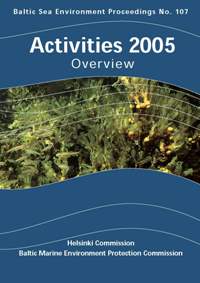Press release
HELCOM releases Annual Report on 2005 activities
 Helsinki, 19 June (HELCOM) – The Helsinki Commission, the inter-governmental organisation for the protection of the Baltic Sea marine environment, today released its annual report on 2005 activities.
Helsinki, 19 June (HELCOM) – The Helsinki Commission, the inter-governmental organisation for the protection of the Baltic Sea marine environment, today released its annual report on 2005 activities.
The report summarises the activities of the Helsinki Commission (HELCOM) related to the protection of the Baltic marine environment over the period March 2005 to March 2006. It provides latest HELCOM assessment of the current trends in the Baltic marine environment, as well as details recent HELCOM activities aimed at curbing the eutrophication caused by the excessive nutrient loads entering the sea, preventing pollution involving hazardous substances, improving safety of navigation and accident response capacity as well as halting habitat destruction and the decline in biodiversity.
“For the Helsinki Commission, 2005 was a year marked by decisive, strategic steps forward. In the future it may well be considered as one of the defining moments in our efforts to make the Baltic Sea a more environmentally sound and healthier place,” says Anne Christine Brusendorff, HELCOM’s Executive Secretary.
In 2005, the Helsinki Commission resolved to create a new Baltic Sea Action Plan, which would include a wide-ranging strategy to reduce pollution and reverse the degradation of the marine environment.
“The basis for the decision to draw up this plan was, of course, the present state of the Baltic Sea, and the fact that in spite of environmental protection successes over the last three decades, the measures currently in place will not be enough to cope with mounting pollution and other environmental problems,” says Brusendorff. “It was also driven by the growing awareness that if we lose any more time by failing to base policy decisions firmly on environmental considerations, we will undermine both the prospects for the future recovery of the marine environment, and a vital resource base for the future economic prosperity of the whole Baltic region.”
The HELCOM Baltic Sea Action Plan will provide a unique opportunity to take wide-ranging and purposeful actions to achieve the ultimate target of having a healthy marine environment with balanced eco-systems for the benefit of present and future generations.
“This ambitious plan of action is completely different from any other plan or programme previously undertaken by HELCOM,” points out Brusendorff.
One revolutionary aspect of the new plan is that instead of following the administrative approach of aiming to cut specific pollution loads to certain target levels – which in some cases may not be favourable enough to adequately restore the marine environment – the whole plan will be based on a clear set of Ecological Objectives defined to reflect a common vision of a healthy Baltic Sea. These objectives include easily understandable goals such as clear water, the absence of excessive algal blooms, and a return to the natural distributions of plants and animals. The good ecological status of the marine environment will be based on a holistic view, defining acceptable human impacts, but not compromising the overall ecological health of the sea.
The plan will identify the kind of actions needed to achieve these Ecological Objectives within a given timeframe for the main environmental priorities: combating eutrophication, curbing inputs of hazardous substances, ensuring maritime safety, and halting habitat destruction and the ongoing decline in biodiversity.
Another major highlight of the HELCOM Baltic Sea Action Plan is that it will be elaborated with the active participation of all major stakeholder groups in the region – from governments, through industry and NGOs, right down to individual citizens living on the shores of the Baltic Sea, to ensure that the plan is relevant and can be effectively implemented in practice.
The consultation process behind the drafting of HELCOM’s Baltic Sea Action Plan was officially launched at a ‘kick-off’ Stakeholder Conference held on 7 March 2006 in Helsinki, Finland, where more than 200 participants, representing scientific and business communities, governments of the coastal countries, the EU, as well as major regional organisations met to discuss the objectives of the strategy and to provide input to its further development.
After a series of meetings and a final Stakeholder Conference in March 2007, which will review a preliminary draft of the plan, the finalised environmental strategy will be adopted at a HELCOM Ministerial Meeting scheduled to take place on 15 November 2007 in Warsaw, Poland.
The annual report can be viewed on HELCOM's web site at http://www.helcom.fi/stc/files/Publications/Proceedings/bsep107.pdf. To order your print copy, please call the HELCOM Secretariat: + 358 (0)207 412 649 or send an e-mail to info@helcom.fi.
For more information, please contact:
HELCOM Secretariat
Mr Nikolay Vlasov
Information Secretary
Tel: +358 (0)207 412 635
Fax: +358 (0)207 412 639
E-mail: nikolay.vlasov@helcom.fi

